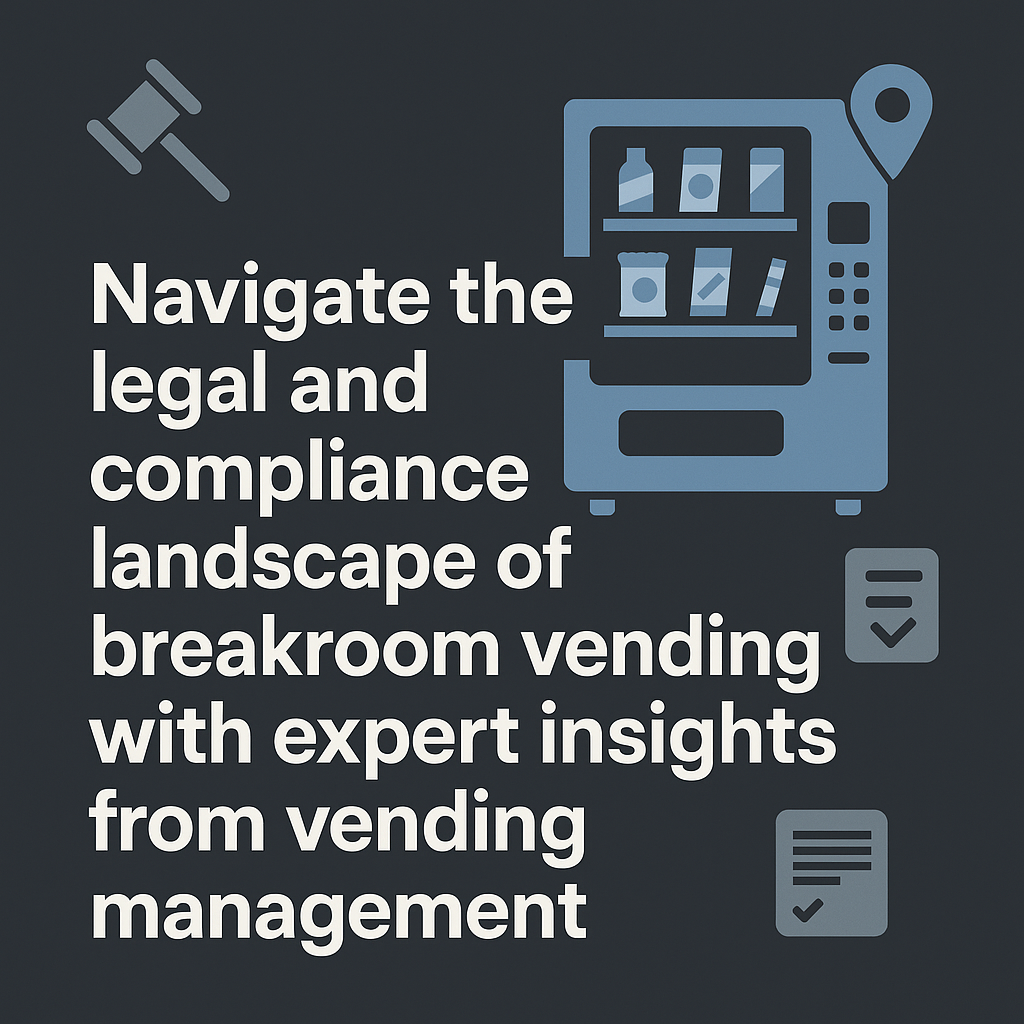Legal and Compliance Aspects of Vending Management
Navigate the legal and compliance landscape of breakroom vending with expert insights from vending management companies.
Back to Vending Management Companies ResourcesNavigate the legal and compliance landscape of breakroom vending with expert insights from vending management companies.
Back to Vending Management Companies ResourcesImplementing a vending program requires navigating various legal and compliance requirements, from health and safety standards to contractual agreements and accessibility laws.
![]() Adherence to food safety and hygiene regulations
Adherence to food safety and hygiene regulations
![]() Compliance with ADA and accessibility standards
Compliance with ADA and accessibility standards
![]() Proper contractual agreements and liability protection
Proper contractual agreements and liability protection

The vending industry operates within a complex web of legal and compliance obligations. For any business considering vending services, understanding these aspects is crucial to ensure smooth operations, protect consumers, and mitigate risks. This involves adherence to various national, state, and local regulations that govern everything from machine placement to product content and payment systems.
One of the primary legal considerations is accessibility. Vending machines, especially those in public spaces, must comply with the Americans with Disabilities Act (ADA), ensuring they are accessible to individuals with disabilities. This includes features like appropriate height for controls, clear instructional signage, and accessible payment methods. Beyond accessibility, maintaining high standards of health and safety is paramount. Vending operators are responsible for ensuring that all food and beverage products meet stringent food safety regulations, including proper temperature control for perishables and clear labeling of ingredients and potential allergens. Locations should inquire about their partner's protocols for product expiration and machine cleanliness to stay compliant. For more details on what to look for in a service provider, consider this guide on questions to ask a vending management company.
Contractual agreements form the backbone of any vending service partnership. These contracts detail the responsibilities of both the business hosting the machines and the vending service provider. Key clauses often cover service frequency, maintenance schedules, revenue sharing, term lengths, and termination conditions. It is essential for businesses to carefully review and understand these terms to avoid disputes and ensure their interests are protected. Liability also plays a significant role; who is responsible if a machine malfunctions, causes injury, or provides an expired product? Typically, service providers carry comprehensive insurance, but understanding the specifics within your contract is vital. Additional insights into contract details can be found in discussions around common clauses in vending contracts.
With the increasing popularity of cashless and mobile payment options, data privacy and security have become critical compliance areas. Vending systems processing electronic payments must adhere to Payment Card Industry Data Security Standard (PCI DSS) requirements to protect sensitive cardholder data. Businesses should also be aware of consumer protection laws, ensuring fair pricing, accurate product descriptions, and clear refund policies. Transparent communication regarding all aspects of the vending service fosters trust and enhances the overall customer experience. To ensure your agreement is solid, reviewing information on understanding vending service contracts is highly recommended.
By proactively addressing these legal and compliance aspects, businesses can establish a vending program that is not only convenient and profitable but also fully compliant and socially responsible. Partnering with experienced vending management companies can simplify this complex process, offering peace of mind and ensuring that your vending services meet all necessary regulatory requirements.
Key documents include service agreements, commission agreements, and compliance certifications.
They select machines meeting accessibility standards, ensure proper placement, and offer accessible payment options.
Data security protocols and PCI compliance are critical to protect customer payment information.
Yes, regulations cover food storage temperatures, product expiration dates, and machine sanitation.
Clear terms on service frequency, maintenance, liability, revenue sharing, and termination clauses.
Typically, the vending operator carries insurance to cover product-related issues and misvends.
Yes, vending operators must secure all necessary local business licenses and permits for their machines.
General liability insurance protects against accidents, product liability, and property damage.
Regulations dictate what types of foods can be sold, temperature requirements for perishables, and labeling specifics.
Utilizing Energy Star certified machines and adhering to local waste and recycling guidelines.